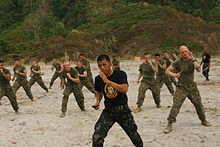Balikatan

Philippine army Lt. Col. Henry Bellan, left, and U.S. Army Lt. Col. John Garrity bury a time capsule during the construction of a footbridge in San Narciso, Zambales, Balikatan 2013

U.S. Marines participated in a martial arts class taught by Philippine Marine Corps instructors, Balikatan 2010 (BK '10)

U.S. Navy captains are briefed on Philippine and U.S. Navy events at a pre-sail conference aboard the amphibious assault ship USS Essex, Balikatan 2008

Philippine Marines and villagers from Tiptipon, Jolo pose with U.S. Marines and Sailors assigned to the 31st Marine Service Support Group, Balikatan 2006.
Balikatan is the name for the annual military exercises between the Philippines and the United States. It is a Tagalog word meaning "shoulder-to-shoulder". The April 2016 10-day exercises is the 32nd iteration of the Balikatan exercises.[1] The exercises have been the cornerstone of Philippines–United States military relations since the U.S. bases in the Philippines closed.[2]
Australian armed forces have participated in Balikatan exercises annually since 2014.[3][1] Australia has a visiting forces agreement, a type of a status of forces agreement, with the Philippines called Philippines–Australia Status of Visiting Forces Agreement.[3] The Philippines is open to other countries participating provided that they too have a similar forces agreement.[3]
Contents
1 Background
2 Operations
3 See also
4 References
5 External links
Background
The U.S. acquired the Philippines after the Spanish–American War of 1898 and the subsequent Philippine–American War. The United States granted the Philippines independence in 1946.[4] In 1951, the governments of the United States and the Philippines signed the Mutual Defense Treaty to "strengthen the fabric of peace" in the Pacific by agreeing to defend each other's territory in the case of external attack.[5] In line with this treaty, the United States maintained until 1992 several military bases in the Philippines, including U.S. Naval Base Subic Bay and the Clark Air Base.
In 1998, following the bases' closure, the Visiting Forces Agreement (Philippines – United States) (VFA) was signed which contained guidelines for the conduct and protection of American troops visiting the Philippines and stipulated the terms and conditions for the American military to enter Philippine territory. The VFA is a reciprocal agreement in that also outlines the requirements for Philippine troops visiting the United States.[6]
The Visiting Forces Agreement led to the establishment of the Balikatan exercises, as well as a variety of other cooperative measures.[7]
Operations
The Balikatan exercises are designed to maintain and develop the security relationship between the two countries' armed forces through crisis-action planning, through enhanced training to conduct counterterrorism operations, and through promoting interoperability of the forces.[8]
Over the years the exercises have expanded to include surrounding other countries in Southeast Asia. The training has also had a shifting focus. During the U.S.-led "War on Terror" the annual Balikatan Exercises focused on training for counterterrorism missions.[8] There has been some controversy over these exercises; a growing number of Philippine people are angry over the continued presence of U.S. troops in the Philippines.[9]
These military exercises contribute directly to the Philippine armed forces' efforts to root out Abu Sayyaf and Jemaah Islamiyah and bring development to formerly insurgent-held areas, notably Basilan and Jolo. They include not only combined military training but also civil-military operations and humanitarian projects. The International Military Education and Training (IMET) program is the largest in the Pacific and the third-largest in the world, and a Mutual Logistics Support Agreement (MLSA) was signed in November 2002.
See also
- Operation Enduring Freedom – Philippines
- Enhanced Defense Cooperation Agreement
References
^ ab Laude, Jaime (April 7, 2015). "Phl-US war games to be held in West Phl Sea". Yahoo News Philippines. Philippine Star. Retrieved 8 April 2015..mw-parser-output cite.citation{font-style:inherit}.mw-parser-output q{quotes:"""""""'""'"}.mw-parser-output code.cs1-code{color:inherit;background:inherit;border:inherit;padding:inherit}.mw-parser-output .cs1-lock-free a{background:url("//upload.wikimedia.org/wikipedia/commons/thumb/6/65/Lock-green.svg/9px-Lock-green.svg.png")no-repeat;background-position:right .1em center}.mw-parser-output .cs1-lock-limited a,.mw-parser-output .cs1-lock-registration a{background:url("//upload.wikimedia.org/wikipedia/commons/thumb/d/d6/Lock-gray-alt-2.svg/9px-Lock-gray-alt-2.svg.png")no-repeat;background-position:right .1em center}.mw-parser-output .cs1-lock-subscription a{background:url("//upload.wikimedia.org/wikipedia/commons/thumb/a/aa/Lock-red-alt-2.svg/9px-Lock-red-alt-2.svg.png")no-repeat;background-position:right .1em center}.mw-parser-output .cs1-subscription,.mw-parser-output .cs1-registration{color:#555}.mw-parser-output .cs1-subscription span,.mw-parser-output .cs1-registration span{border-bottom:1px dotted;cursor:help}.mw-parser-output .cs1-hidden-error{display:none;font-size:100%}.mw-parser-output .cs1-visible-error{font-size:100%}.mw-parser-output .cs1-subscription,.mw-parser-output .cs1-registration,.mw-parser-output .cs1-format{font-size:95%}.mw-parser-output .cs1-kern-left,.mw-parser-output .cs1-kern-wl-left{padding-left:0.2em}.mw-parser-output .cs1-kern-right,.mw-parser-output .cs1-kern-wl-right{padding-right:0.2em}
^ Tritten, Travis J. (April 15, 2011). "wards Digital Editions Contact Us Home Delivery". Stars & Stripes. Retrieved 5 May 2014.
^ abc Depasupil, William B (May 16, 2014). "AFP open to more foreign allies joining 'Balikatan'". The Manila Times. Retrieved 19 May 2014.
^ "Philippines: A Country Study" Federal Research Division, U.S. Library of Congress
^ The Avalon Project, "Mutual Defense Treaty Between the United States and the Republic of the Philippines; August 30, 1951", Avalon Project Yale Law School, Lillian Goldman Law Library
^ "Visiting Forces Agreement" U.S. Department of State, 1998
^ "Frequently Asked Questions: Visiting Forces Agreement" Presidential Commission on the Visiting Forces Agreement
^ ab Camp General Emilio Aguinaldo, "PH-US Balikatan Exercises to Start in May" Armed Forces of the Philippine, April 21, 2014
^ Sandy Araneta, "Student activists protesting Balikatan deface US embassy seal" The Philippine Star, April 17, 2012
External links
| Wikimedia Commons has media related to Balikatan. |
- Official Facebook page
